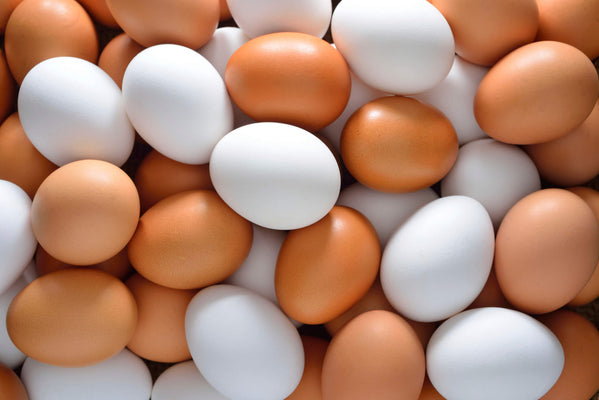Eggs may be essential to many of our favourite meals and recipes, but how many of us actually know how they are produced?
And it's not our fault!
The egg industry operates almost entirely behind closed doors, away from the public eye.
The conditions in which the chickens that lay these eggs live their lives are kept secret from consumers to protect the bottom line.
And they have every right to do that — it is a market, first and foremost.
However, the major problem with their secrecy is that eggs can only be classified as halal or haram, depending on how they're produced.
So, if we Muslims don't know how eggs are produced, it's impossible to determine their halal status.
If you've ever been left wondering whether eggs are halal or haram, and you don't have a halal calculator — this quick guide to egg's halal status will help you decide whether or not to consume this ingredient in your diet.
Sources of eggs
While chicken eggs are the most popular kind, eggs are gotten from other kinds of birds, such as;
- Ducks
- Geese
- Turkeys
- Quail
- Ostriches
- Eagles
- Vultures
- Pigeons
Eggs are also gotten from Fish, Amphibians, and Reptiles.
Some Muslim scholars agree that eating eggs from animals that are allowed is equally halal. The allowed animals are;
- Chicken
- Duck
- Goose
- Turkey
- Quail
- Pigeons
- Ostrich
- Fish
They consider the eggs of Amphibians, Reptiles, and Birds of prey (eagles, vultures, etc.) haram.
However, some Scholars argue that they are permissible, except for those of snakes, due to their poisonous effect.
Are unlaid eggs halal?
When a hen is slaughtered, it's common to find an unlaid egg in its abdomen.
It usually comes in various shapes and sizes, with a yolk-like appearance and soft-shelled forms.
Scholars agree that an unlaid egg is halal regardless of how the hen is killed. It does not have to be slaughtered following Islamic principles.
Scholars also agree that the blood of an egg is considered pure as long as the egg hasn't gone bad.

Eating eggs that had sufficient time to develop
Eggs that had enough time to develop into a chick are considered haram.
In some countries like Asia and the Philippines, a duck or chicken egg is fertilised and nurtured for 16 to 20 days until it develops into a nearly wholly grown embryo. The stillborn chick is then cooked and eaten from the shell.
This type of egg is considered haram.
Benefits of eggs
Eggs are known for various benefits to our health, such as;
Improves brain health
Choline, an essential vitamin for good memory, mood, and muscular function, is abundant in eggs.
Consuming choline through foods such as eggs may help prevent cardiovascular disease, early brain dysfunction such as dementia, and fatty liver disease."
Boosts eye health
Lutein and zeaxanthin are two essential nutrients in eggs that fight some degenerative processes that might harm our eyes.
Consuming enough levels of these nutrients has been shown in studies to lower the incidence of cataracts and macular degeneration dramatically.
Eggs reduce the risk of heart disease.
Eggs contain nutrients that have heart-healthy and heart-disease-preventive elements.
These nutrients include folate, unsaturated fatty acids, vitamin E, and specific B vitamins.
Protein Source
Proteins are the building blocks of life, necessary for muscle and tissue strength and repair.
Eggs are commonly thought to be a high-quality protein source. One egg contains around 6.3 grams of protein.
The protein in eggs has a tremendous benefit since it contains all nine necessary amino acids in adequate proportions to enable optimal muscle development, recovery, and maintenance.
While some other meals provide more protein than eggs, the exceptional quality and bioavailability of protein in eggs are unmatched.
Highly nutritious
Eggs are known for their high nutritious value.
It is also a good source of some rare nutrients, such as vitamins D and B12, as well as the mineral iodine.
Eggs are considered a 'complete' protein source because they include all nine necessary amino acids that we should receive from our diet.
Build healthier bones
Eggs are one of the few natural sources of vitamin D, which aids in calcium absorption, bone health, neuromuscular function, and inflammation reduction.
Various critical minerals and vitamins in eggs include DHA (in higher concentrations from pasture-raised hens), other B vitamins, and fat-soluble vitamins A, D, E, and K.
The trace elements iodine and selenium are frequently overlooked or underutilised, although they have a role in brain development, thyroid function, and liver function.
Aids in weight loss
Eggs are one of the most acceptable dietary alternatives for weight control since they are low in calories and high in protein.
Eggs' high satiety levels contribute to increased feelings of satisfaction, less hunger, and a decreased urge to eat later in the day.
Eggs are abundant in protein, making them perfect as part of several dietary patterns that might help people manage their weight.
Egg consumption can also help minimise changes in glucose levels, which can have long-term advantages in controlling eating behaviours.
Streamlines the ageing process
Eggs contain nutrients which help to lower the risk of a variety of deficits and illnesses during old age.
They also include a considerable quantity of leucine, an amino acid needed for continued muscular support, and other critical nutrients such as vitamin D, Omega-3 fatty acids, and choline, a little-known substance necessary for brain function.
Conclusion
Eggs are halal as long as they pose no danger to your health, and they have not been left to develop fully. If you're looking to get all the essential nutrients you need without worrying about halal status, Chewwies has unmatched reviews for our gummy supplements.


